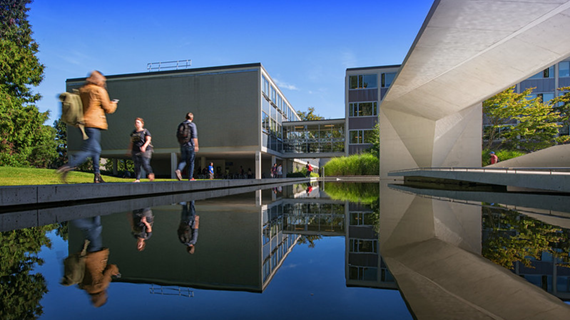

By Eric Szeto
You know the old adage: like father like son. The verity of this saying, in Paul Russell’s case, holds true.
“My father was a philosopher at Queens [University], so I grew up in a world of philosophy,” says Russell, who teaches in the Deptartment of Philosophy. “When I first started university I didn’t think I would go into philosophy — history and politics were my major interests at that point,” he adds. “But gradually my background began to show its influence and I felt the pull of philosophy get stronger over time.”
Russell, who started teaching at UBC in 1987, believes there is no exact formula to being a good professor. One thing he feels is essential is providing a comfortable and supportive learning environment for his students. He says this involves making it clear, not only that philosophical questions matter and are important, but also that thinking about philosophy can be enjoyable and good fun. “It is important to give students a sense of the worth and value of their own contributions,” he adds. “This is especially true in a field like philosophy where dealing with technical, abstract problems is commonplace and the critical analysis of ideas can be intimidating.”
Cultivating this learning environment, he says, can make a world of difference to students. “There are professors who can be a bit abrasive in their classroom manner,” Russell says. “Sometimes this works, as some students respond well to it. But it’s not my style. I like to feel that we are all working together and that there is a good atmosphere for everyone.” He adds: “I like my students to feel that they are glad to be in the classroom and that there’s an appropriate level of mutual respect among all those who are present.”
Russell says he couldn’t teach well unless he creates this. “It’s sort of selfish because I just don’t feel very happy myself unless there’s that environment in the classroom.” Class, he feels, should be a time when students are interacting and engaging in dialogue — something he considers essential to a good philosophical education. “I’m around very bright and energetic and motivated people and they’re young, and there’s a kind of energy level and dynamic that I like to feed off,” he says. “I think it’s two-way traffic. It’s not just me giving something to them; it’s also them giving something to me.”
While working on his PhD at Cambridge, Russell was supervised by Professor Sir Bernard Williams, regarded by many as the most important British moral philosopher of his time. “Williams had,” Russell says, “a big influence on me and served as excellent example of what a philosopher can be. He was not only a distinguished academic, he was also an important public figure who showed how philosophy is relevant to all aspects of human life — whether it be the arts, politics, the sciences, and so on.”
Russell’s main interests include both the history of philosophy — especially the work of the Scottish philosopher David Hume — as well as problems of free will and moral responsibility.He has written books about the limits of free will, and The Riddle of Hume’s Treatise: Skepticism, Naturalism, and Irreligion (Oxford University Press: 2007). He has already received high praise for his book, Freedom and Moral Sentiment: Hume’s Way of Naturalizing Responsibility (Oxford University Press: 1995).
Russell knows that his published works and other philosophical texts cater to a narrow audience with relevant knowledge of the field. “You don’t see too many philosophy books making the best-sellers list,” he says.
“Although academic philosophy can be technical and highly specialized, the fundamental problems of philosophy — making sense of our own lives and existence, and forming a capacity to think critically about our most basic assumptions and values — is essential to all forms of civilized and humane social life.
“Many students who come to university are excited about these problems and the opportunity to read and think clearly about them.”
Russell says that students who take philosophy can develop valuable skills from the discipline and these can be easily and usefully carried over to other careers and professions.
“Even if students are not going on in academic philosophy, hopefully it helps them think about issues in a clearer and more precise way.”
